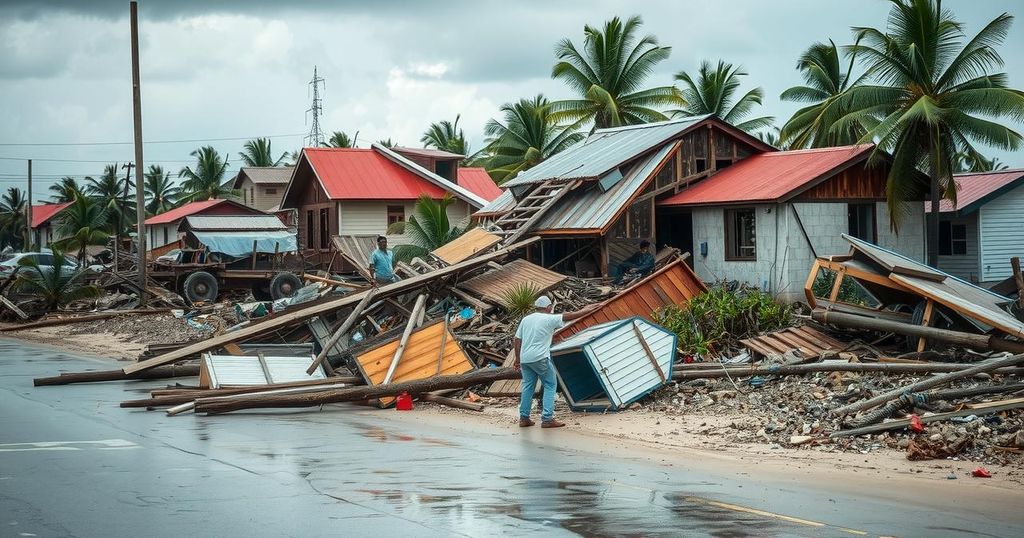World news
AFRICA, DISASTER MANAGEMENT INSTITUTE OF SOUTHERN AFRICAN, EMERGENCY RESPONSE, FRENCH, HURRICANE BERYL, KAM, KAMAR, MALAWI, MAYOTTE, MECUFI, MINISTRY OF OVERSEAS FRANCE, NATURAL DISASTER, NATURAL DISASTERS, PAULINE JACQUART, PETITE - TERRE, UNICEF, UNITED NATIONS
Daniel O'Connor
0 Comments
Cyclone Chido’s Devastation: A Humanitarian Crisis in Mayotte and Mozambique
Cyclone Chido has caused widespread devastation across Mayotte and Mozambique, with over 120 confirmed deaths in Mozambique and significant casualties and destruction in Mayotte. The cyclone’s impact has plunged hundreds of thousands into humanitarian crisis, necessitating urgent assistance for shelter, food, and mental health support as local and international organizations coordinate relief efforts.
Cyclone Chido has wreaked havoc across Mayotte and Mozambique, leaving a dire humanitarian situation in its wake. After hitting Madagascar on December 14 and proceeding to northern Mozambique and southern Malawi by December 17, the cyclone unleashed winds peaking at 243 km/h, displacing and endangering countless populations. The human toll continues to escalate, with reports indicating at least 120 fatalities in Mozambique and 35 in Mayotte, alongside 2,500 injuries.
In Mayotte, the aftermath has dramatically transformed the landscape. Widespread destruction includes homes reduced to debris and a severe lack of basic necessities such as food, water, and electricity. Local resident Kamar, aged 8, expressed the despair felt by many of losing everything: “My house was completely destroyed. We’ve lost everything… I hope that everyone is safe.” The resilient spirit of the community is echoed in the urgent calls for assistance from humanitarian organizations like HI.
Mozambique’s situation is equally tragic, with reports indicating that Cyclone Chido has impacted at least 380,000 individuals. The United Nations and UNICEF confirm this, highlighting the particular plight of over 90,000 vulnerable children. In the severely affected districts of Mecúfi and Metuge, the destruction is staggering—99% of housing has been lost, leaving families without shelter as the rainy season sets in. Mindful of these challenges, HI has mobilized its mental health experts to provide support in these regions.
Healthcare professionals on the ground, such as nurse Claire from Mayotte, described the scene as unprecedented. “Nobody had ever seen or experienced anything like this before,” she stated, reflecting the extent of environmental devastation. The urgency of the need for shelter, clean drinking water, and food cannot be overstated, as communities work to rebuild from the ruins.
HI continues to assess the needs of the affected populations closely and coordinates with local authorities and other humanitarian groups to ensure effective response efforts. The overwhelming need for shelter, mental health support, and sustenance for victims is more pressing than ever, maintaining a focus on the most vulnerable segments of the population, including those with disabilities.
Ultimately, Cyclone Chido has devastated two regions significantly, claiming lives, destroying homes, and deeply impacting the livelihoods of many. Humanitarian organizations are mobilizing for relief efforts to address the urgent needs arising from this natural disaster. The ongoing evaluations of needs in both Mayotte and Mozambique will help drive the essential support needed to assist those affected on the path to recovery.
Cyclone Chido, a powerful storm that struck the Indian Ocean regions in mid-December, has had devastating consequences across Madagascar, Mayotte, and Mozambique. Its high winds and torrential rains caused massive destruction, triggering humanitarian crises. The cyclone’s impact on local infrastructure, combined with the onset of the rainy season, has created a situation where immediate relief and long-term recovery efforts are critically necessary. The roles of local and international humanitarian organizations are essential in assessing needs and providing assistance amid the rising death toll and injuries reported in these regions.
In conclusion, Cyclone Chido has had a catastrophic impact on both Mayotte and Mozambique, leading to a rising death toll and significant displacement of communities. With thousands of homes destroyed and basic necessities in critical supply, there is an urgent need for humanitarian action. Organizations like HI are actively engaged in restoring hope and safety for the affected populations as they strive to recover from this natural disaster.
Original Source: reliefweb.int




Post Comment